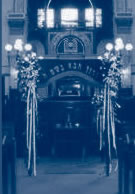|
SEDRA : Vaera Shabbat Rosh Chodesh: Hertz
Chumash p. 232 Exodus Chapter 6 Verse 2
This week's Sedra is generously sponsored by Avi Berman
SYNOPSIS:
G-d reassures Moses following the great despair accompanying
the first and absolute rejection by Pharaoh of Moses' demands
on behalf of the Israelites. G-d restates His covenant and
relationship with the Patriarchs and in a powerful declaration
He reveals the 4 stages of Redemption which will come about
through His intervention for He is fully aware of the suffering
of His people.
The people are so deeply oppressed that they do not accept
this reassurance which results in Moses too suffering a crisis
of confidence. G-d however insists and orders Moses and Aaron
to initiate the redemption. The Sedra now presents a genealogy
of Moses and Aaron, the descendants of Levi as they now formally
assume the role of representing the Israelites.
G-d emphasises Moses' role as G-d's representative to Pharaoh
with Aaron as "prophet" or spokesman. These meetings
take the form of an extended series of dramatic confrontations.
The pattern which emerges is that Pharaoh will continually
harden his heart, but his power and self-confidence will be
repeatedly and dramatically crushed by G-d's great wonders
and signs until all Egypt will clearly know His greatness.
Having been instructed by G-d, Moses and Aaron demonstrate
the first sign: Aaron casts his rod down and it changes into
a snake. Pharaoh's wizards do likewise, but their serpents
are eaten by that of Aaron. Pharaoh's heart hardens and he
refuses to comply.
This is followed by the first plague foreshadowed by Moses
and effected by Aaron who, in the presence of Pharaoh and
his advisers, puts out his rod and turns all the waters of
Egypt into blood. Pharaoh's wizards are able to copy this
and he again refuses to be budged.
After seven days Moses confronts Pharaoh and requests permission
for the Israelites to depart to serve their G-d. He warns
Pharaoh that refusal will result in a plague of frogs. Pharaoh
is unmoved.
The plague is brought into effect and Pharaoh's wizards are
able to copy the miracle. Pharaoh budges temporarily and the
next day the plague ceases. Once the plague is lifted he again
resumes his intransigence.
Aaron is then commanded to retaliate by bringing on a plague
of gnats. The magicians are stumped by this and begin to recognise
the Divine Power, but Pharaoh holds firm in his refusal.
The fourth plague - a mixture of pests - is invoked and in
this plague the land of Goshen where the Israelites live is,
by design, completely unaffected. The plague is immensely
destructive and Pharaoh calls upon Moses to bring relief and
he offers the Israelites the opportunity to serve G-d in Egypt.
Moses insists that the people must serve G-d in the wilderness
where He directs. Pharaoh consents but with the removal of
the plague he immediately reneges on his promise.
G-d then commands Moses to threaten Egypt's herds of livestock
with pestilence. Again the Israelites' stock will remain completely
unscathed. The plague is brought on and again Pharaoh is resolute
in his stubbornness.
Moses is now instructed to cause the sixth plague: boils.
This plague affects every Egyptian individually. The magicians
in particular are overwhelmed by their powerlessness to do
anything to ward off the plague - for they too are greatly
affected. Pharaoh remains unmoved in his refusal. Moses is
instructed to warn Pharaoh yet again.
He threatens a plague of hail and warns Pharaoh that every
living thing should be brought under shelter for the plague
will be ferocious and all-consuming. The plague is invoked
with massive destructive consequences for the countryside
of Egypt. The Israelites and their property are untouched.
Pharaoh hastens Moses into his presence and confessing his
guilt begs him to have G-d stop the hail. Moses complies,
the tempest abates and reveals the complete devastation of
the land of Egypt. Again Pharaoh's heart hardens and he refuses
to let Israel depart.
HAPHTORAH ROSH CHODESH HERTZ CHUMASH P. 944 Isaiah Chapter
66
The final chapter of Isaiah comprises the reading when Shabbat
and Rosh Chodesh coincide owing to its reference in the penultimate
verse to the continued and ever more popular observance of
Rosh Chodesh in the future. The chapter combines fierce admonition
for those who pervert sincere observance, mock the ways of
G-d and worship idolatry while it also describes the rebirth
of Israel and the ingathering of exiles. The penultimate verse
referring to Rosh Chodesh is repeated again after the conclusion
of the Haphtorah. Although some Synagogues read the Haphtorah
for Re=eh with its words of comfort, our custom is to read
the Haphtorah for Rosh Chodesh since it too bears a message
of consolation (Kitzur Shulchan Aruch)
TELL ME RABBI ..... THE MONTH OF ELLUL
SHOFAR: From the first of Ellul we customarily blow 3 Shofar
blasts (Tekiah, Shevarim, Teruah) daily at the conclusion
of the Morning Service. On 1st Ellul Moses ascended Mt Sinai
for the second time amidst the blast of the Shofar to pray
for Israel's forgiveness for worshipping the Golden Calf.
This would inaugurate a mood of penitence.
YOM TOV CARDS ! The Shulchan Aruch points our that when writing
a letter during Ellul one should wish the addressee a Ketivah
v'chatimah Tovah - to be and Inscribed and Sealed for Good.
From the desire to fulfil the beautiful thought implied in
this concept arose the idea to send cards. One is thus automatically
put in a position where it is appropriate to fulfil this custom.
BACK TO SHABBAT SHALOM
TABLE
|








